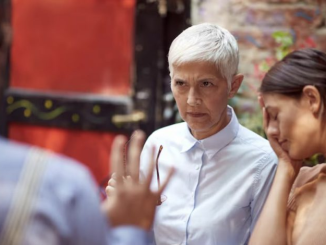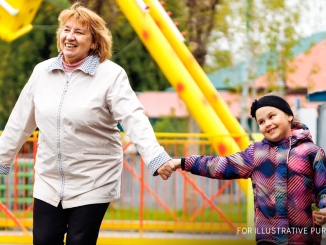
Clara was sitting on the edge of the bed in her small city apartment, her eyes red from crying and her mind lost in memories and plans.
The phone vibrated occasionally—a message from her friend, a missed call from Mariana, her mother-in-law—but there was no sign of Tomás.

The next morning, Clara woke up early, even though she had barely slept.
He made himself a bitter coffee and looked out the window at the still sleepy city.
His thoughts flew to his son.
Had he slept well? Had Tomás brought him home carefully? Her heart sank.
I couldn’t go on like this.
At noon, the intercom rang.
It was Tomás, holding Luca’s hand.
The boy smiled, tired but sincere, and jumped into his mother’s arms.
Thomas said nothing.
Not even Clara.
Only the exchange of glances between them was laden with everything they hadn’t had the courage to say out loud over the past few years.
“Clara…” he began, but she interrupted him.
I need time.
I don’t want to talk now.
Leave him here with Luca and go.
Tomas nodded slowly and left the apartment without saying a word.
The time Clara had asked for was not an escape, but a strategy.
In the following days, he began to put his thoughts and… his papers in order.
She made copies of the marriage certificate, looked up the phone numbers of several lawyers, and, most importantly, started going to therapy.
For his part, Tomás began sending her long messages, full of regrets, flowers left at the door, but never real apologies.
He didn’t understand what he had truly lost: a woman who for years had neglected her own grief to keep the family together.
Clara, on the other hand, was changing.
With each therapy session, with each quiet night with Luca, with each deep breath without fear of scandal, I gained strength.
One day, when Tomás insisted on “speaking civilly,” Clara agreed.
She waited for him calmly, with a list in her hand.
“Listen to me until the end, without interruptions,” he said.
Thomas tried to answer, but stopped when he saw in her eyes a determination he had never seen before.
—For ten years I forgave you for your outbursts, your humiliations, your broken promises.
I waited for you to change, to see the real me.
Not because I’m perfect, but because I deserve respect.
Now it’s my turn to choose.
I don’t want to live like this anymore.
I have filed the divorce papers.
You can have shared custody if you prove that you are capable of being a good father.
Thomas was speechless.
It wasn’t the first time Clara threatened to separate, but this time it was real.
His voice was calm, but firm.
There was no anger, but liberation.
—But, Clara, I… I love you.
—Maybe so, but love without respect or balance hurts.
And I can’t stand it anymore.
The following months were complicated, but full of meaning.
Clara moved to a smaller apartment, close to Luca’s school.
He began working as a freelance graphic designer—a passion he put aside for “the sake of the family.”
The therapy continued, as did the support of her friends.
Not everyone understood his decision, but it didn’t matter anymore.
Every day, Clara felt like she was rebuilding her life.
Thomas, on the other hand, oscillated between anger and pleading.
He attended some counseling sessions, more out of commitment than conviction.
Only when the court established strict visitation and child support did she begin to understand the gravity of the loss.
One Sunday, Luca returned from his father’s house and said to his mother:
—Dad told me he made a mistake and that he wants to improve.
But he also told me that you are the bravest person he knows.
Clara looked at her son and hugged him.
—If I managed to do this much—show you that it’s okay to choose the right thing, even if it’s difficult—then I’ve succeeded.
Years later, Clara was no longer just “Tomás’s ex.”
She had become a fulfilled, free woman, with a career of her own and a heart that no longer beat with fear.
And on a warm May night, with the scent of lilacs and a gentle breeze, she happened to meet Tomás in a park where Luca was playing with his friends.
“Are you okay, Clara?” he asked sincerely.
—I’m fine, Tomás.
And you?
—I try hard.
Thank you… for having the courage to leave.
She smiled.
There was no longer any need for reproaches or explanations.
Each one had learned his lesson.
And sometimes, the greatest form of love is knowing how to say “enough.”
If you enjoyed the story, don’t forget to share it with your friends! Together we can spread the excitement and inspiration.



Leave a Reply